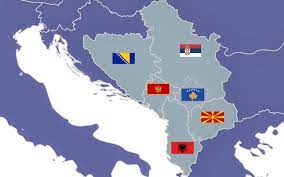
By Gustavo Cunha, Matheus Colucci
since the last decade, the countries of the Balkan region try to join the European Union Block (EU) due to socioeconomic benefits. However, none of them could, indeed, be part of, at most they achieved candidate status for the accession process - with the exception of Bosnia and Herzegovina and Kosovo, which failed to qualify at this level.. In addition, noteworthy, that Serbian domestic politics, in specific, it's quite troubled: on one side is the Radical Party, formed by nationalists opposed to Serbia's entry into the European Union, while at the other pole there are parties in favor of this movement of approximation., for there would be many economic advantages to the nation.
From these conflicts and barriers to enter the European Union, the Balkan countries, no year of 2019, under the leadership of Serbia, Albania and Northern Macedonia decided to team up and create a kind of “mini-Schengen”, inspired by the Schengen agreement signed by the EU in 1985, that is, an area of free movement of people and goods. In addition to these main members, Kosovo, Montenegro and Bosnia and Herzegovina can also participate. Until now, only Serbia and Albania actually signed the agreement on this., so citizens of both countries can now move freely between them..
currently, only Montenegro did not accept to participate in this new agreement, as it still longs for EU acceptance. Worth highlighting, that one of the main motivations for the creation of the mini-Schengen, in addition to the free movement of people, is to create a strong market in the region, like this, leveraged the economy of these countries.
in economic matters, according to a World Bank estimate, participating countries would save up to $3,2 billions of dollars every year, due to the movement of free movement of goods, services and people. Several businessmen from the three countries were positive about the agreement, recognizing that it will enable access to a larger market and attract investment in the region, in addition to preparing companies for future integration into the European Union market. Yet, Skeptics believe that without a joint initiative to improve government policy there will be no significant improvement., after all, many investors remain away from the region because they do not trust the judicial system of certain countries.
However, the major obstacle to the agreement is in the political sphere, mainly in the sense of the non-entry of other countries in the Balkan region, it is expected that this integration can generate unfair competition with countries that did not join the bloc, furthermore, the agreement could result in an increase in political tensions in the region., which is historically known for being confrontational, in that regard, a point that deserves attention is the non-participation of Kosovo, an Albanian majority country, which is not recognized by Serbia, country from which Kosovo became independent in 2008, However, its autonomy had been recognized by few countries..
In this way, the agreement generated several uncertainties at the international level and was criticized even by representatives of EU countries. On a recent visit to the Balkans, German Chancellor Angela Merkel spoke about the reforms of the judiciary in the countries, necessary for possible EU membership., what encouraged countries to continue pursuing this goal, highlighting the importance of the Berlin Process, project she started in 2014 with the objective of increasing the integration of the six countries of the Balkan region, but that never culminated in an agreement between the possible participants.. For her, this project cannot be replaced and is a path for countries to join the EU
If the Mini Schengen represents just a strategy aimed at proving the autonomy of the Balkan countries to the EU, a plan by countries to become more dominant in the region or actually an attempt to develop together through economic cooperation, nothing changes the main objective of these countries, which is to become a member of the EU eventually, which leads us to conclude that: This race between the countries of the Balkans to obtain the approval of the European Parliament could end up hindering a process of real integration of these countries and when one of them is approved, possible agreements like the Berlin Process and Mini Schengen go down the drain.
Sources:
ORLANDI, GIORGIA. albania says “more than ready” to start negotiating EU membership. Euro News. News date: 13 from May of 2021. Available in: https://pt.euronews.com/2021/05/13/albania-diz-se-mais-do-que-pronta-para-comecar-a-negociar-adesao-a-ue. Access in: 15 September 2021.
EU Slams Open Balkan Initiative as “Unhealthy Competition” to EU Accession Process. Exit News. News date: 01 September 2021. Available in: https://exit.al/en/2021/09/01/eu-slams-open-balkan-initiative-as-unhealthy-competition-to-eu-accession-process/. Access in:15 September 2021
SINORUKA, FLOWERS. Merkel Bids Farewell to Balkans with Exhortation to Reform. Balkan Insight. News date: 14 September 2021. Available in: https://balkaninsight.com/2021/09/14/merkel-praises-albanias-progress-on-farewell-balkan-tour/. Access in: 15 September 2021.
STEFANOVIC, MIRKO. The Western Balkans and EU Accession. news diary. News date: 06 February 2021. Available in: https://www.dn.pt/opiniao/opiniao-dn/convidados/os-balcas-ocidentais-e-a-adesao-a-ue-11793939.html. Access in: 15 September 2021.
STOJKVSKI, BOJAN. Businesses Eye Boost, But also Barriers, in ‘Open Balkan’ Initiative. Balkan Insight. News date: 30 August 2021. Available in: https://balkaninsight.com/2021/08/30/businesses-eye-boost-but-also-barriers-in-open-balkan-initiative/. Access in: 15 September 2021.
